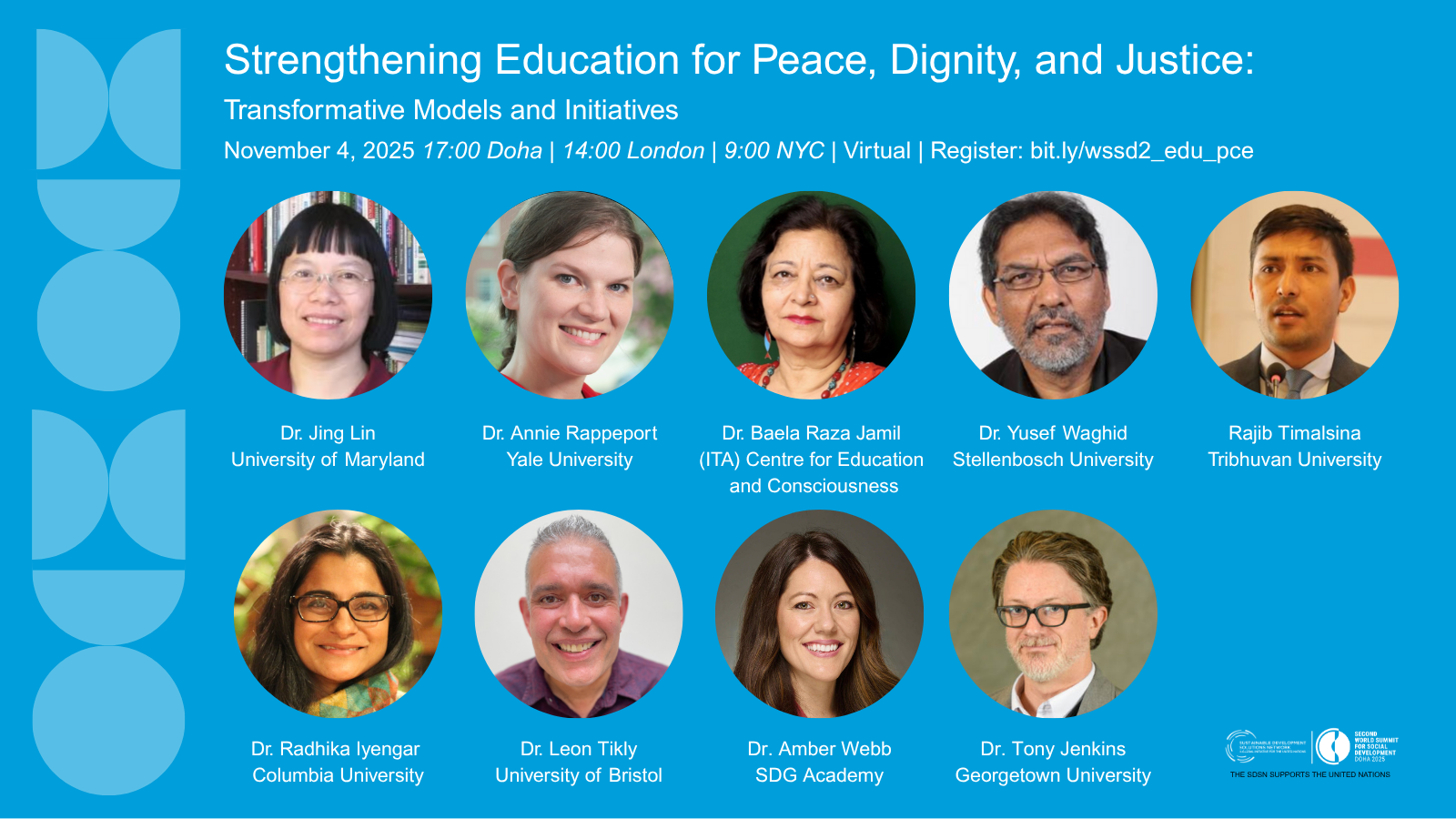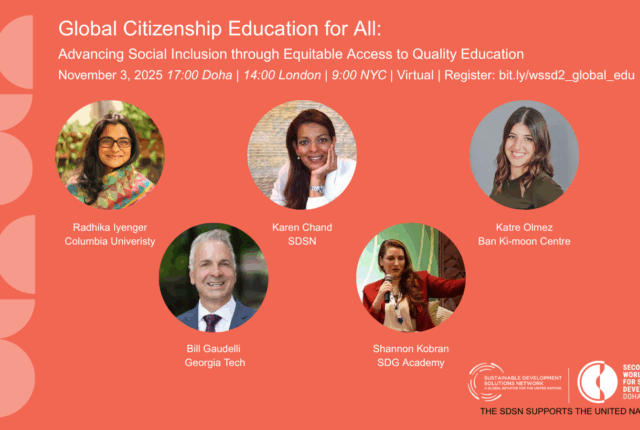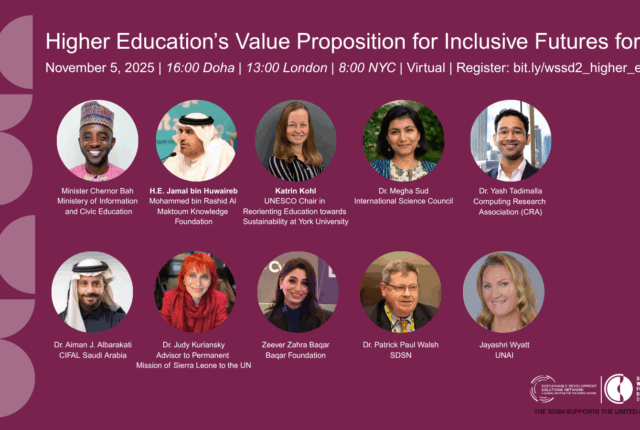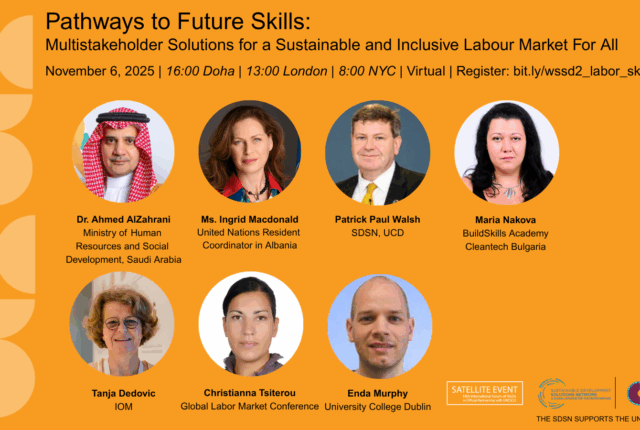By Dr. Amber Webb, SDG Academy
This week marks the UN’s Second World Summit for Social Development convened in Doha, Qatar and virtually online. The Summit aims to renew global commitments to building more inclusive, equitable, and people-centered societies. Building on the goals of the 1995 Copenhagen Summit, this week’s events seek to accelerate progress on poverty eradication, full employment and decent work, and social inclusion, while aligning with the 2030 Agenda for Sustainable Development. By bringing together world leaders, civil society, and the private sector, the Summit aims to assess current challenges, close persistent social gaps, and adopt an action-oriented political declaration that strengthens cooperation and delivers concrete solutions for social progress.
To contribute to the dialogue, the Sustainable Development Solutions Network (SDSN) hosted several events, including an official side event to advance the topic of education as an enabler of social development, titled “Strengthening Education for Peace, Dignity, and Justice: Transformative models and initiatives.” Education remains central to the social development agenda since it can empower individuals to participate fully in economic, political, and cultural life, laying the foundation for more just and equitable societies. By equipping people with adequate knowledge and skills, education can foster social cohesion, nurture philosophies of care, and encourage lasting progress.
Yet, a critical recent finding highlighted by UNESCO’s Futures of Education report (2021) is that access to education is not enough. Positive social transformations require quality education, centered on values of peace, harmony, and inclusion – all shaped by local contexts. Simply expanding access to education has not proven to drastically improve global conditions since current systems often reproduce existing inequalities and fail to equip learners with the critical skills needed to address complex global challenges. While more children than ever are enrolled in schools, credited in part to the UN’s Millennium Development Goals (MDGs) and Sustainable Development Goals (SDGs), we still live in a world burdened with conflict, one that has failed to address injustice and systemic violence.
Consequently, the content, context, and purpose of education must be reimagined to promote social, economic, and environmental peace. The session,“Strengthening Education for Peace, Dignity, and Justice: Transformative models and initiatives,” moderated by the SDG Academy’s Amber Webb, highlighted many of these considerations in education. Renowned peace educator, Tony Jenkins, provided opening remarks highlighting the power of reflexive processes and turning learning into action. Esteemed panelists, including Annie Rappeport and Yusef Waghid, emphasized the value of co-creating knowledge and working towards common liberation. While Jing Lin, Baela Raza Jamil, and Rajib Timalsina pressed the audience to understand education’s potential for healing and compassion, yet also as a source of provocation and social change. Discussant, Radhika Iyengar, closed the session with an eye to the future, envisioning what education can become, especially as we move towards the end of the UN’s 2030 Agenda. In the aftermath of the event, an outcomes document was submitted to UN organizers with three key themes to integrate into education policies and practice:
Co-creation of knowledge through dialogic pedagogy
Co-creation of knowledge through dialogic pedagogy is an educational approach in which teachers and learners engage in open dialogue to construct understanding together, rather than relying on one-way transmission of information. Rooted in Paulo Freire’s critical pedagogy, this model values each participant’s experiences, perspectives, and insights as essential contributions to the learning process. Through dialogue, learners not only gain knowledge but also develop critical awareness, empathy, and agency. This approach is valuable because it democratizes education, fosters mutual respect, and prepares individuals to engage thoughtfully and collaboratively in diverse and interconnected societies—skills essential for promoting equity, justice, and lasting peace.
Embracing lived experience through reflexive praxis and storytelling
Reflexive praxis in education refers to the ongoing process in which educators and learners critically reflect on their own beliefs, actions, and assumptions in order to improve their teaching and learning practices. Storytelling holds profound value because it connects the intellectual and emotional dimensions of learning to foster empathy, understanding, and reconciliation. Reflexive praxis and storytelling are deeply connected because both involve reflection, dialogue, and the construction of meaning through lived experience. Via these pedagogical techniques, learners encounter diverse perspectives and human experiences, allowing them to see beyond narrow viewpoints and cultivate compassion for others.
Education for healing, compassion, and care
Education for healing, compassion, and care centers on the holistic development of learners, recognizing that emotional well-being and human connection are fundamental to meaningful learning and peaceful societies. This approach goes beyond academic achievement to nurture empathy, resilience, and a sense of shared humanity. By creating safe, inclusive spaces where learners can reflect, listen, and support one another, education becomes a practice of healing from trauma, injustice, and social division.
A recording of the event can be found below, on the SDSN YouTube Channel, or in the SDG Academy Library.



